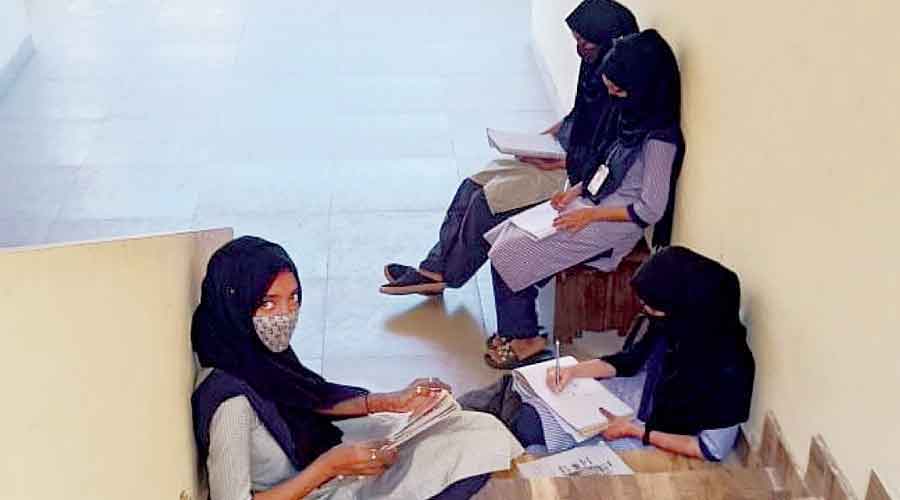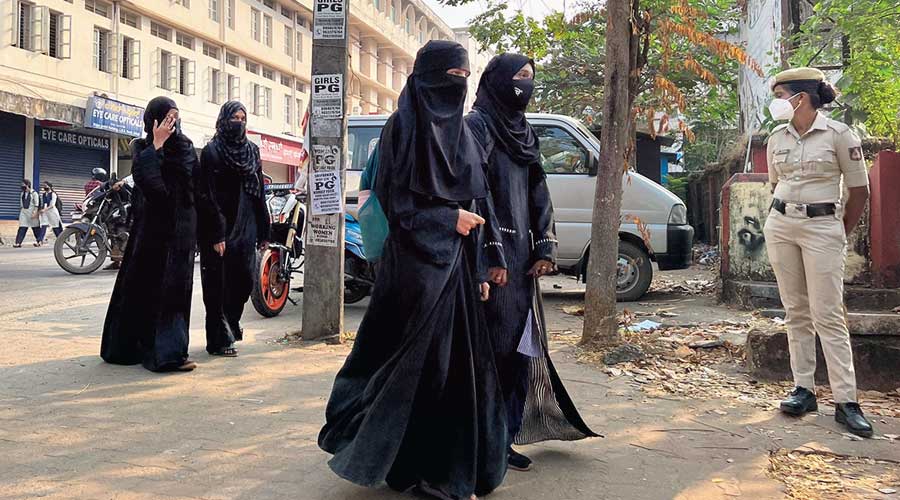Hijab-clad girl students were heckled and harassed on streets and campuses by saffron-wearing youths before Karnataka’s government educational institutions banned the Islamic headscarf from classrooms in February.
But even after the ban, Muslim girls who take off their hijabs before entering the classrooms continue to be mocked and bullied by teachers and male students, the People’s Union for Civil Liberties has said in a fact-finding report.
The report, which comes at a time the Supreme Court is hearing a challenge to Karnataka High Court’s upholding of the hijab ban, has urged the registration of cases against the heads of institutions where Muslim girls are allegedly facing harassment.
A sample from the instances the 39-page report cites from government schools and colleges across the state:
⚫ Some Muslim girls at a college in Raichur began wearing hoodies after being prohibited from wearing the hijab.
“Lecturers reportedly told the students, ‘Tum soch badlogi toh zamaana badlega (Society will change if you change your thinking)’, ‘zamaane ke saath chalo (Move with the times)’, ‘Tum bold bano (Be bold)’ and other such variations,” the report says, quoting students who spoke to the PUCL interviewers in Urdu.
⚫ “In Hassan district, students described ways in which hijab-wearing girls in their college were constantly targeted by lecturers, and even harassed by boys who sent vulgar messages on the phone,” the report, titled “Impact of hijab ban in Karnataka’s educational institutions: An interim study” and released on Friday, adds.
The “hijab-wearing girls” referred to are girls who habitually wear the hijab outside their school or college premises.
The PUCL says that Muslim girls’ testimonies “indicate that a range of rights which are guaranteed to all Indian citizens have been comprehensively violated post the judgment of the High Court of Karnataka”.
“These rights which have been violated include (the) right to education without discrimination, right to equality, right to dignity, right to privacy, right to expression, right to non-discrimination and freedom from arbitrary state action.”
Media rap
The report accuses Kannada news channels of providing biased coverage and, at times, hounding hijab-wearing girls before the ban came into force.
“In one notorious video, a Dighvijaya TV reporter with camera is seen chasing a young hijab-wearing child (on) the school campus, even as the teacher vainly implores the reporter not to harass the child,” the report says, referring to an incident in Shimoga in February.
“They (news anchors) have often been one-sided in their presentations, giving undue coverage to Hindutva hate groups identified with recorded history of mass violence; even while glossing over the aggressive role of students who wore a saffron shawl in so called opposition to the hijab.”
The child welfare committee of the Karnataka government had pulled up seven Kannada news channels over the alleged violation of child rights while covering the hijab issue, but it had little effect.
The hijab ban came after two months of an acrimonious controversy, triggered by the Government Pre-University College in Udupi banning the headscarf last December on the ground that it wasn’t part of the uniform.
Banned from the classrooms, six hijab-wearing girl students started a protest, loitering or studying in the college corridors and on staircases during class hours.
The matter snowballed with several other government institutions banning the hijab after Hindu students of the Government Pre-University College in Kundapur, Udupi district, started a counter-protest by turning up wearing saffron stoles.
The state’s BJP government on February 5 issued an order saying the school and college committees, which include representatives of parents’ associations, had the power to decide on students’ uniforms. Taking the cue, most such committees banned the hijab.
Karnataka High Court on March 15 upheld the institutions’ right to decide their students’ uniform and ruled that the hijab was not an essential religious practice in Islam. It directed a ban on other kinds of religious clothing such as saffron stoles on campuses.
The Supreme Court is now hearing review pleas filed by students.











